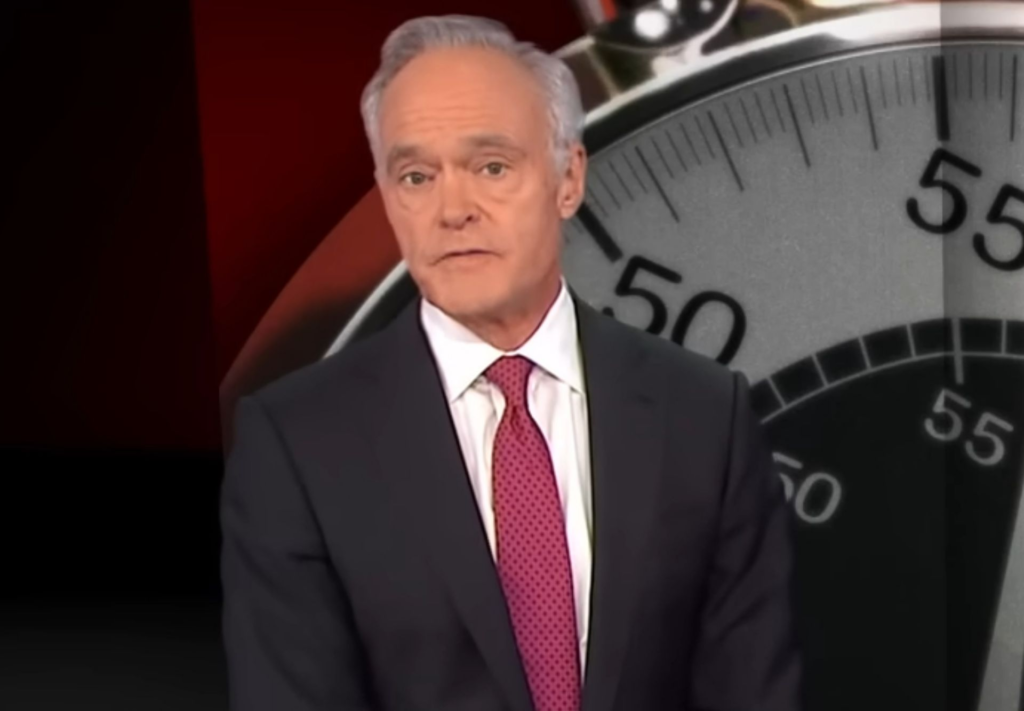
Scott Pelley honored “60 Minutes” Executive Producer Bill Owens on-air and criticized the corporate owner following his resignation last week.
Last week, “60 Minutes,” the iconic investigative news program that has shaped American journalism for over five decades, bid farewell to one of its most influential figures, Executive Producer Bill Owens. Owens, who served as the guiding force behind “60 Minutes” for a significant period, made an indelible mark on the show and the broader landscape of broadcast journalism. As Owens resigned, he left behind a legacy of excellence, integrity, and innovation. In a heartfelt tribute during the show’s Sunday broadcast, Scott Pelley, a long-time correspondent for “60 Minutes,” honored Owens’ contributions, acknowledging not only the successes but the challenges the program faced under his leadership.
However, Pelley’s tribute was not without its critique. As the cameras rolled and the iconic CBS News set gleamed behind him, Pelley took the opportunity to address the broader corporate environment that led to Owens’ departure. His comments, though respectful of Owens’ tenure, also subtly criticized the direction the program had taken under its corporate owner, CBS Corporation. In a rare moment of candor, Pelley voiced concerns over the changing dynamics of the news industry, questioning the motivations behind the corporate decisions that had ultimately led to Owens’ resignation.
Bill Owens’ resignation marked the end of an era for “60 Minutes,” and in his final moments as Executive Producer, Owens received the kind of tribute that is rarely bestowed upon media executives. His career spanned over a decade, during which he transformed the show into a multimedia powerhouse while preserving its core values of investigative journalism and ethical reporting. Under Owens’ leadership, the program tackled some of the most sensitive and important issues of the day, from political corruption to corporate malfeasance.
Owens brought a keen sense of innovation to “60 Minutes,” embracing new forms of storytelling while remaining committed to the program’s time-honored format. The show continued to grow in influence under his stewardship, attracting viewers from all walks of life who trusted “60 Minutes” for its in-depth, no-holds-barred approach to reporting. During his tenure, Owens helped launch some of the program’s most memorable and impactful segments. Whether it was a scathing exposé on corporate greed, a deep dive into environmental degradation, or an interview with world leaders, Owens ensured that “60 Minutes” remained relevant in an ever-changing media landscape.
As the newscast began, Scott Pelley, who has been a cornerstone of “60 Minutes” for nearly two decades, addressed the audience with a heavy heart. Pelley’s tribute to Owens was not just a nod to the executive’s professional achievements but also a personal reflection on the profound impact Owens had on the newsroom. In his on-air statement, Pelley recalled the first time he met Owens, describing him as a visionary leader who understood the delicate balance between journalistic integrity and the fast-paced demands of network television.
Pelley spoke of Owens’ leadership style, emphasizing the importance of fostering a newsroom environment where investigative journalism could thrive. “Bill Owens was a champion of truth, a protector of integrity, and an unwavering advocate for fairness,” Pelley said, his voice steady but tinged with emotion. “Under his guidance, ’60 Minutes’ continued its tradition of holding the powerful accountable and shining a light on the stories that mattered most.”
The tribute to Owens was filled with anecdotes and behind-the-scenes stories that highlighted his collaborative spirit and commitment to excellence. Pelley fondly recounted how Owens pushed the team to think outside the box, urging correspondents and producers to take risks in their reporting while never compromising on accuracy. “He reminded us every day that the truth is not just what is easy to report—it is what needs to be told,” Pelley said.
But beyond the praise, Pelley also touched on the broader implications of Owens’ resignation, pointing out the growing pressure from corporate entities on journalistic integrity.
While the focus of Pelley’s tribute was undoubtedly on Owens’ impressive career, it quickly became clear that Pelley was also using this moment to address a larger issue—one that had become increasingly evident in recent years: the growing influence of corporate interests on journalism.
Pelley’s words, though carefully chosen, were laced with a quiet critique of the corporate owners of CBS, and more specifically, the decisions that led to Owens’ departure. In a moment that caught the attention of viewers and industry insiders alike, Pelley remarked, “Bill Owens was not only a colleague and friend but someone who understood that the essence of ’60 Minutes’ lies in its independence from corporate interests. He was committed to telling the stories that mattered, even when they weren’t the easiest to report or the most marketable.”
This statement underscored a growing concern among many journalists about the increasing corporate meddling in newsrooms. The desire for sensationalism and profitability often conflicts with the core values of investigative journalism, where nuanced, in-depth reporting is paramount. Pelley’s tribute, while honoring Owens’ legacy, was also an acknowledgment of the challenges facing modern journalism—a landscape that is rapidly being shaped by conglomerates seeking to maximize profits over journalistic autonomy.
Though Pelley did not name CBS directly, it was clear that he was alluding to the shifting priorities within the network, particularly in an era of corporate consolidation. With network ratings and ad revenues dictating much of the content produced, there is a palpable tension between what the audience wants to see and what journalists believe needs to be reported. The pressure to appeal to mass audiences and keep corporate stakeholders satisfied has increasingly encroached on the editorial independence that once defined programs like “60 Minutes.”
The resignation of Bill Owens was not an isolated incident but part of a broader trend within the media industry. Corporate ownership has long been a point of contention among journalists who argue that it compromises the integrity of the news. As media conglomerates grow in size and influence, the financial demands on news outlets intensify, leading to more reliance on advertising revenue and ratings-driven programming. This shift has led to the prioritization of entertainment-oriented content over hard-hitting investigative journalism.
Under Owens’ leadership, “60 Minutes” maintained a sense of autonomy, focusing on the quality of reporting rather than the commercial viability of a story. However, the demands of the modern media environment are hard to ignore. The financial realities of running a major news operation are difficult to reconcile with the ideals of independent journalism. Pelley’s remarks seemed to reflect this tension, as he acknowledged the difficulty of balancing journalistic integrity with corporate priorities.
In recent years, the corporate consolidation of media companies has led to significant changes in the way news is produced. The once-untouchable nature of investigative journalism is increasingly vulnerable to budget cuts and programming decisions driven by profitability. As a result, many talented producers, reporters, and executives like Bill Owens find themselves at odds with a corporate structure that may not fully appreciate the value of in-depth, long-form reporting.
As “60 Minutes” moves forward without Owens at the helm, the program’s future remains uncertain. The show has long been a pillar of investigative journalism, but the shifting dynamics within CBS and the broader media landscape raise questions about the program’s ability to maintain its reputation for hard-hitting reporting.
Bill Owens’ departure could signal a turning point for “60 Minutes” as it grapples with the increasing influence of corporate ownership. However, the legacy of Owens’ leadership is likely to have a lasting impact on the program’s direction. In the face of mounting challenges, “60 Minutes” will need to navigate the delicate balance between editorial independence and the commercial pressures placed upon it.
As Scott Pelley’s tribute demonstrated, the show’s strength lies not only in its investigative rigor but in its ability to stand firm in the face of corporate pressure. “60 Minutes” has always been about more than just ratings or profits; it is about serving the public good and holding power to account. Whether the program can continue to do so in an era of corporate dominance remains to be seen.
Scott Pelley’s tribute to Bill Owens was a poignant moment that reflected the heart of the journalistic struggle in today’s media environment. As corporate interests continue to dominate the media landscape, journalists are being forced to confront difficult questions about their role in society. The challenges facing “60 Minutes” and other news programs are emblematic of a larger crisis in journalism—a crisis that calls for a renewed commitment to journalistic independence, integrity, and accountability.
Pelley’s tribute to Owens was more than just a farewell to a colleague—it was a subtle reminder that the values of truth, transparency, and accountability must remain at the core of journalism, even as the pressures of the corporate world continue to mount.





